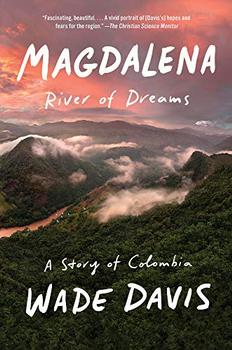Summary | Excerpt | Reviews | Beyond the Book | Readalikes | Genres & Themes | Author Bio

River of Dreams: A Story of Colombia
by Wade Davis
Xandra and I caught up with Carlos in Barranquilla, even as Carnaval spun the city into a fever pitch of joy. We knew him to be a good man. Only the night before he had invited my daughter Tara and her Colombian band, L'Équipe Tambora, to play with him onstage in front of an audience of many thousands. Sharing the spotlight as he so often does, bringing little-known acts into his circle and allowing them to shine in public as never before, is a sign of both his immense generosity and his profound belief that music is a universal muse that, like a spirit being, reaches out to all, as the ultimate weapon of love. It is not the artist that sings the song, he would say, it is the spirit of the song that sings the artist. The stage is a temple. Music serves as prayer. Dancers spin into trance. The audience as congregation rocks to the rhythms of devotion, not for the artist but for his art; songs that touch the far reaches of the soul, the most passionate depths of emotions, even while grounding the spirit in the soil of a nation, leaving everyone not damp with sweat but moistened by the purity of the rains, the promise of the rivers, drenched in all the possibilities of a new day.
The morning after the concert, Carlos and his lovely wife and partner, Claudia Elena Vásquez, along with their two young children, joined us as we crossed the Río Magdalena on a flat-decked ferry to reach an island in the stream, a nature reserve and modest lodge owned by good friends. With industrial Barranquilla as a backdrop, we stood together on the stern in the sun as Xandra and I asked him about music and the river.
"Cumbia is the mother," he began very simply, "the mother of all our rhythms. Its essence and power are so strong. It gave birth to all others, every musical pulse born on the Caribbean coast: porro, gaita, bullerengue, chandé, paseo, puya, and, of course, vallenato. And if Cumbia is the mother of our rhythms, the mother of Cumbia is the Magdalena. The river is our storyteller. It's what defines us as a people, what defines the nation. The Magdalena tells our story, and it does so all the time. It was only by knowing the river that I was able to discover the real origins of Cumbia and, of course, vallenato and every other expression of our hearts and desires and dreams."
Carlos traces the history of musical genres and rhythms much as an anthropologist tracks descent through kinship, with each lineage going back to a common ancestor, which in the case of Colombian music is always the Río Magdalena. Like a siren rising from the depths of the river, bambucos appeared, ballads that evoked the pure poetry of romance, laments of lost love named for a tribal people who had long before slipped away into the mists of time. Porro is a rhythm commonly associated with the Llanos, the great eastern plains. But if you listen carefully, Carlos explained, you can clearly hear the influence of jazz, a fusion that could only have come about during the glory days on the Magdalena when the David Arango, in all of its luxury, carried internationally renowned musicians from Barranquilla upriver to the notorious jazz clubs of La Dorada. Merecumbé is a synthesis of Cumbia and the traditional merengue of the coastal department of Magdalena, invented in a flash by Pacho Galán back in 1950 as he performed on stage in Soledad, just outside of Barranquilla. Vallenatos are also the o spring of Cumbia and, thus, of the river, perhaps less the Magdalena than the Río Cesar, the entire history of which is recounted in their melodies and verse. Cumbia, Carlos believes, goes back not just to the bogas but to the sounds and rhythms of the Chimila and Pocabuy, the very word being derived from two syllables in their language, a reference to the sacred art of making music for the gods.
"The Chimila called the river Kariguaña," Carlos said, "Agua Grande, the big water, the Río Grande. Maybe it's time to once again make it great. For too long we've turned our backs to the sea, to the mountains, to the river, hiding away in cities, always in conflict with nature, in conflict with our land. Music makes us pay attention, to look at the forests, the mountains, and especially the Magdalena, because the origins and essence of everything we work with musically comes from there—rhythms, phrases, melodies. The river is music, and music is the river. What the Magdalena needs is what Colombia needs. After all the violence, we need to cleanse our souls, and only then will we heal. And to heal ourselves, we must heal the river."
Excerpted from Magdalena by Wade Davis. Copyright © 2020 by Wade Davis. Excerpted by permission of Knopf. All rights reserved. No part of this excerpt may be reproduced or reprinted without permission in writing from the publisher.
Your guide toexceptional books
BookBrowse seeks out and recommends the best in contemporary fiction and nonfiction—books that not only engage and entertain but also deepen our understanding of ourselves and the world around us.